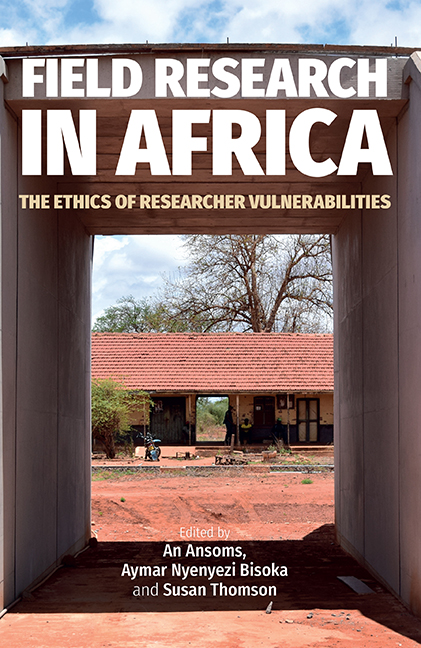Book contents
- Frontmatter
- Contents
- List of Contributors
- Foreword: It is about Us
- Map of Africa showing Fields of Research
- Introduction: Fields of Vision, Emotion as Reflexivity
- 1 Skin Connections: Negotiating Institutional Ethics alongside Insider Identities
- 2 Conducting Sensitive Research ‘At Home’: A Matter of Responsibility
- 3 A Gendered Research Journey: Ethical Dilemmas of an Algerian Immigrant Recovering the Memory of ‘Home'
- 4 Establishing Kinship in the Diaspora: Conducting Research among Fellow Congolese Immigrants of Cape Town
- 5 ‘If they find out, we're dead': Intermediaries, Self-censorship, and Anxiety in Research as an Outsider-Insider
- 6 Looking Behind the Screen: Ethical Quagmires when Accessing Hidden Discourses
- 7 Scholar-Activist? On Relational Accountability and an Ethic of Dissemination
- Conclusion: Theorising Self as Ethical Research Practice
- Bibliography
- Index
2 - Conducting Sensitive Research ‘At Home’: A Matter of Responsibility
Published online by Cambridge University Press: 10 June 2021
- Frontmatter
- Contents
- List of Contributors
- Foreword: It is about Us
- Map of Africa showing Fields of Research
- Introduction: Fields of Vision, Emotion as Reflexivity
- 1 Skin Connections: Negotiating Institutional Ethics alongside Insider Identities
- 2 Conducting Sensitive Research ‘At Home’: A Matter of Responsibility
- 3 A Gendered Research Journey: Ethical Dilemmas of an Algerian Immigrant Recovering the Memory of ‘Home'
- 4 Establishing Kinship in the Diaspora: Conducting Research among Fellow Congolese Immigrants of Cape Town
- 5 ‘If they find out, we're dead': Intermediaries, Self-censorship, and Anxiety in Research as an Outsider-Insider
- 6 Looking Behind the Screen: Ethical Quagmires when Accessing Hidden Discourses
- 7 Scholar-Activist? On Relational Accountability and an Ethic of Dissemination
- Conclusion: Theorising Self as Ethical Research Practice
- Bibliography
- Index
Summary
ACADEMIC LITERATURE OFFERS a wealth of examples of how to collect data (Duschesne and Haegel 2008; Grawitz 2000). It also offers examples of how to put research participants at ease and of how to engage in knowledge construction based on data collected on the ground (Beaud and Weber 2003; Sanford 2006; Quivy and Van Campenhoudt 2011). We find examples of how to care for the researcher's security and for that of their collaborators (Ansoms 2012; Davidson 2004), and how to ensure the anonymity of the research participants (Ansoms 2012; Davidson 2004; Fujii 2010; Sluka 1995). However, very little is written on the ethical challenges embedded in doing research on ‘sensitive’ topics in a ‘sensitive environment’, involving ‘sensitive’ actors. Yamuna Sangarasivam (2001, 95), explaining the way she had to conduct research in a conflict-affected environment, says: ‘Nothing in my academic training prepared me for the methodological challenges I faced while conducting fieldwork in a setting of war. No graduate seminar had schooled me in “methods in the field of battle;” no workshop offered “techniques for researchers, terrorists and native Others”.’
More researchers have begun to carry out their work in settings in which they risk their own lives as well as those of their collaborators and of their research participants (Sriram et al. 2009; Thomson et al. 2013). Researchers are asked to improvise on how to work, live and survive in such environments while ensuring that their research is successfully conducted by the researchers’ own standard. Because of the context in which it takes place, research in conflictual settings rarely bears no consequences. In some countries, the state itself represents a threat to the work of the researcher, especially when the topic appears dangerous to the eye of the state. I am referring here to government elites sitting at high levels of the state machine. In his work Les Risques du Métier. Trois Décennies comme Chercheur-Acteur au Rwanda et au Burundi, Filip Reyntjens (2009, 5) goes over three decades of research work during which he was constantly on the receiving end of ‘political pressure from state actors’.
- Type
- Chapter
- Information
- Field Research in AfricaThe Ethics of Researcher Vulnerabilities, pp. 29 - 44Publisher: Boydell & BrewerPrint publication year: 2021



